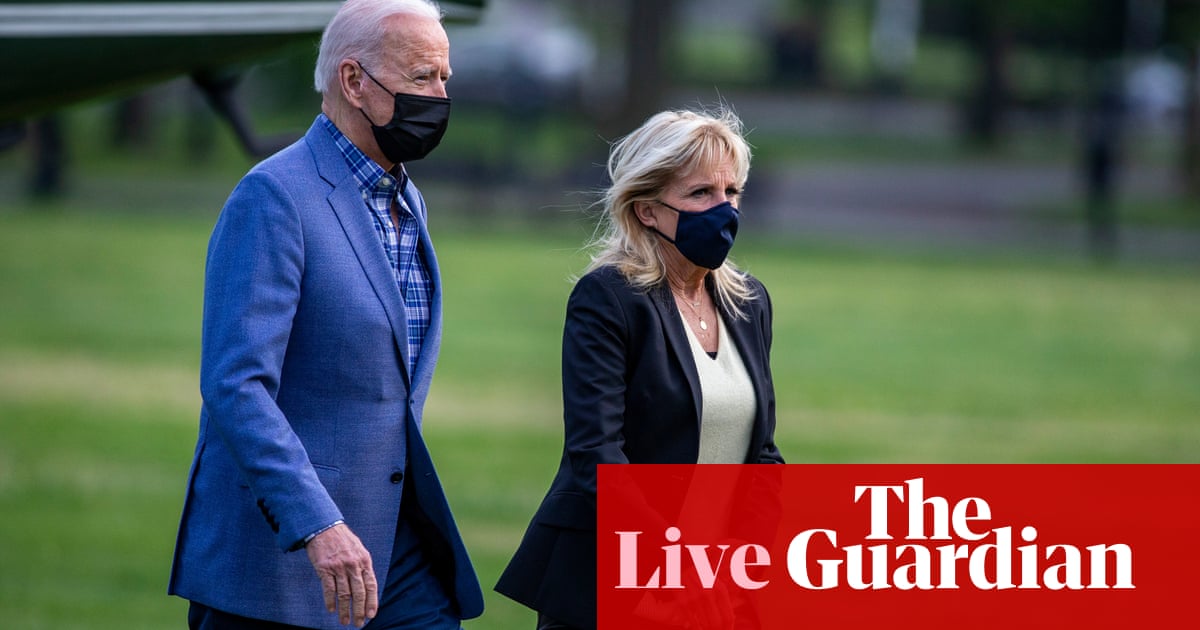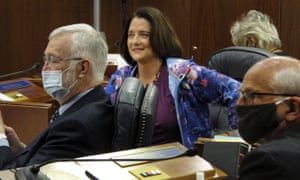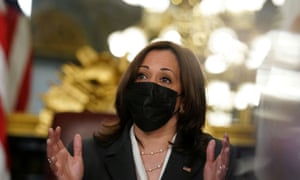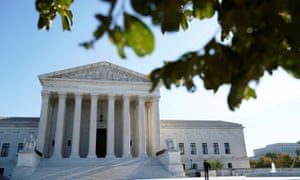
The US could share as many as 60m AstraZeneca vaccine doses in the coming month, once the vaccines passes an expected safety review, the Associated Press reported.
The move expands on a US commitment to share 4m doses with Mexico and Canada, and comes as it has enough vaccine for every eligible American from Pfizer, Moderna and Johnson & Johnson. The AstraZeneca vaccine is authorized around the world, but not yet in the US.
At the beginning of the pandemic the US contracted with multiple pharmaceutical companies to buy vaccines, not knowing which would eventually make it through safety reviews. As a result, the Biden administration has faced increasing pressure to share unneeded vaccine doses internationally.
Zeke Miller (@ZekeJMiller)
WASHINGTON (AP) — The U.S. will begin sharing its pipeline of vaccines from AstraZeneca once the vaccine clear federal safety reviews, the White House said, with as many as 60 million doses expected to be available for export in the coming months.https://t.co/ZgYrrt5sa7
April 26, 2021
Given the strong portfolio of vaccines that the U.S. already has and that have been authorized by the FDA, and given that the AstraZeneca vaccine is not authorized for use in the US, we do not need to use the AstraZeneca vaccine here during the next several months,” said White House Covid-19 coordinator Jeff Zients, according to the AP. “Therefore the US is looking at options to share the AstraZeneca doses with other countries as they become available.”
The news comes as India is experiencing its worst peak in the pandemic, and in recent days has diagnosed more than 350,000 cases of Covid-19 per day. Such widespread Covid-19 spread not only endangers people in India, but around the world as more transmissible or deadly variants may emerge.
Dr Anthony Fauci, the US’s top infectious diseases expert, said on Sunday several measures are being considered, including sending over oxygen supplies, tests, drug treatments and personal protective equipment.
“Bottom line, it’s a terrible situation that’s going on in India and other lower middle-income countries, and there is more we can do,” he said.
Why India’s worsening Covid crisis is a dire problem for the world
The White House press briefing is expected to start at 1pm ET. Watch along with us here.
The Supreme Court accepted what will be a closely watched gun rights case today –it could have a major impact on gun rights across the country.
Here’s more from the AP:
The case marks the court’s first foray into gun rights since Justice Amy Coney Barrett came on board in October, making a 6-3 conservative majority.
The justices said Monday they will review a lower-court ruling that upheld New York’s restrictive gun permit law. The court’s decision to take on the case follows mass shootings in recent weeks in Indiana, Georgia, Colorado and California and comes amid congressional efforts to tighten gun laws.
President Joe Biden also has announced several executive actions to combat what he called an “epidemic and an international embarrassment” of gun violence in America.
The case is especially significant during the coronavirus pandemic, said Eric Tirschwell, the legal director of Everytown for Gun Safety, a gun control group backed by former New York Mayor Michael Bloomberg.
“Gun violence has only worsened during the pandemic, and a ruling that opened the door to weakening our gun laws could make it even harder for cities and states to grapple with this public health crisis,” Tirschwell said.
The court had turned down review of the issue in June, before Justice Ruth Bader Ginsburg’s death.
New York is among eight states that limit who has the right to carry a weapon in public. The others are: California, Delaware, Hawaii, Maryland, Massachusetts, New Jersey and Rhode Island. In the rest of the country, gun owners have little trouble legally carrying their weapons when they go out.
...
The issue of carrying a gun for self-defense has been seen for several years as the next major step for gun rights at the Supreme Court, following decisions in 2008 and 2010 that established a nationwide right to keep a gun at home for self-defense.
In June, Justice Clarence Thomas, joined by Justice Brett Kavanaugh, complained that rather than take on the constitutional issue, “the Court simply looks the other way.”
But Barrett has a more expansive view of gun rights than Ginsburg. She wrote a dissent in 2019, when she was a judge on the federal appeals court in Chicago, that argued that a conviction for a nonviolent felony in this case, mail fraud shouldn’t automatically disqualify someone from owning a gun.
She said that her colleagues in the majority were treating the Second Amendment as a “second-class right, subject to an entirely different body of rules than the other Bill of Rights guarantees.”
Lois Beckett (@loisbeckett)
"The outlook does not look good for gun safety laws at the Supreme Court...the Court could issue a radical Second Amendment ruling that jeopardizes future progress as well as lifesaving gun laws already on the books." @GiffordsCourage says in a statement.
April 26, 2021
Republican Alaska lawmaker Lora Reinbold is banned from Alaska Airlines flights, after she has repeatedly refused to wear a mask. Masks can help protect other people from exposure to Covid-19 and other illnesses, if worn properly.
The ban is a major problem for the lawmaker, because Alaska Airlines operates the only flight to and from the capital, Juneau. Instead, she had to make a 14-hour trek to get to work
We have notified Senator Lora Reinbold that she is not permitted to fly with us for her continued refusal to comply with employee instruction regarding the current mask policy,” airlines spokesman Tim Thompson told the Anchorage Daily News.
“This suspension is effective immediately, pending further review. Federal law requires all guests to wear a mask over their nose and mouth at all times during travel, including throughout the flight, during boarding and deplaning, and while traveling through an airport,” he said.

This is Reinbold in 2020 May, when she refused to wear a mask in the Alaska capital.
FILE - In this May 18, 2020 file photo, Alaska state Sen. Lora Reinbold, center, is shown on the Senate floor in Juneau, Alaska.
“It didn’t make sense to me,” Reinbold said. “I saw no research on cloth, silk, cotton face coverings ... that they prevent COVID.”
In fact, there is research to show they can protect others from Covid, especially when people double-mask. Photograph: Becky Bohrer/AP
The Biden administration will create a task force to promote union membership, the New York Times reports.
“No previous administration has taken a comprehensive approach to determining how the executive branch can advance worker organizing and collective bargaining,” the document states,” a fact sheet obtained by the Times said.
Noam Scheiber (@noamscheiber)
Biden, continuing his unusually pro-labor stance (for a president), is creating a White House task force to promote union membership. VP Harris will chair it, top cabinet officials are on it. https://t.co/SMsUbhioYm
April 26, 2021
Vice President Kamala Harris is expected to tell United Nations members today that now is the time to start prepping for the next global pandemic, including how to increase capacity for personal protection equipment and support women.
Here’s more from the Associated Press:
The virtual address, Harris’ second to a UN body since her inauguration, will come as the United States makes progress on vaccinating the public and much of the world struggles to acquire vaccines.
“At the same time that the world works to get through this pandemic, we also know that we must prepare for the next,” Harris will say, according to excerpts of the speech obtained by The Associated Press. The speech will be co-hosted by UN permanent representatives of Argentina, Japan, Norway and South Africa.
The Biden administration will mark its first 100 days in office this week. President Joe Biden is scheduled to address Congress on Wednesday and is certain to highlight the headway his administration has made in responding to the worst public health crisis in the U.S. in more than a century.
Harris, according to the excerpts, will broadly outline how the administration thinks the U.S. and other nations should consider focusing their attention. The steps include improving accessibility to health systems, investing in science, health workers and the well-being of women, and surging capacity for personal protective equipment and vaccine and test manufacturing.
Harris says much has been learned over the last year about pandemic preparedness and response but that it would be unwise to rest easy
“We have been reminded that the status quo is not nearly good enough, and that innovation is indeed the path forward,” Harris says.\

Vice President Kamala Harris is expected to call on world leaders to prepare for the next global pandemic now. Photograph: Kevin Lamarque/Reuters
The Biden administration is facing intensifying pressure from Democrats to include health reform in his “human infrastructure” plans, expected in a speech before a joint session of Congress on Wednesday.
Advocacy groups such as Public Citizen and the Center for Popular Democracy have both met with the Biden administration as part of the push, Politico reported.
Seventeen senators also pushed for expansions of Medicare in a letter over the weekend, calling for dental, hearing and vision benefits for seniors on the publicly run government insurance program. Medicare provides health benefits to adults older than 65, as well as some smaller groups such as people on dialysis.
“We have an historic opportunity to make the most significant expansion of Medicare since it was signed into law. We look forward to working with you to make this a reality and, in the process, substantially improve the lives of millions of older Americans and persons with disabilities,” the group wrote.
Leading progressive senators Bernie Sanders and Elizabeth Warren were among the group. They also called on Biden to consider lowering the age at which people can qualify for Medicare.
Lowering the Medicare eligibility age to 60 could expand Medicare coverage to 23 million people, including nearly 2 million uninsured people, while lowering it to 55 could give over 42 million people access to the program, and lowering it to 50 could cover 63 million Americans.
Biden's infrastructure plan should cover childcare and home care. Here's why | Jamaal Bowman
Importantly, vaccine hesitancy may not only impact the speed with which the US can tamp down on Covid-19 cases. The resources which have been diverted to fight Covid-19 have also impacted lead testing, childhood vaccination rates, substance abuse services and sexually transmitted disease testing.
Here’s more from a story co-authored by the Guardian’s @ninalakhani and your liveblogger:
“This is either the second or first worst pandemic in modern human history,” said Dr Howard Markel, a pandemic historian and pediatrician at the University of Michigan. “We knew there would be repercussions and unintended consequences.”
Now, there is a “whole menu of neglect” to address as a national vaccine campaign allows people to slowly emerge from a year of lockdowns and social distancing. “There is no historical precedent for this,” added Markel.
In the first few months of the pandemic alone, at least 400,000 children missed screenings for lead, a toxic heavy metal. Doctors and nurses ordered 3m fewer vaccines for children and 400,000 fewer for measles specifically.
For the first time, clinics were forced to ration lab tests for sexually transmitted diseases as lab capacity and supplies were diverted to test for Covid-19. Contact tracers were also re-deployed from tracking chlamydia, gonorrhea and syphilis cases to finding people in contact with Covid-19 patients.
Data from one large commercial lab showed 669,000 fewer HIV tests were processed. Compared to 2019, the lab diagnosed nearly 5,000 fewer cases of HIV. Delayed diagnosis can lead to people unwittingly transmitting the virus.
Last year, more than 87,000 Americans died of drug overdoses as substance abuse clinics shuttered – the highest death toll since the opioid epidemic began. Some of those clinics never fully reopened, as funding dried up.
While some of these metrics have rebounded since the most severe lockdown in March and April 2020, most have failed to fully catch up as health services remain stretched due to ongoing Covid outbreaks and budget cuts. Meanwhile millions of Americans have lost employer health insurance, slipped into poverty or had lives thrown into upheaval.
Importantly, experts warn that the pandemic is likely to widen health inequalities for those who already had disproportionately worse health – including racial and sexual minorities, the poor and the rural Americans.
“Just as this has accelerated all of the disruptive movements of American society, this has really exposed vulnerability based on poverty, poor access to healthcare, housing issues – the social determinants of health we’ve been talking about for years,” said Markel.
‘Menu of neglect’: the long-term health problems being ignored in US amid pandemic
CBS This Morning asked White House senior advisor on Covid-19 response, Andy Slavitt, whether vaccine hesitancy was a “political problem” because of high levels of hesitancy among Republicans.
We think that people want to be informed and want to be educated, we know some people have questions,” said Slavitt. He went on to add that vaccine distribution “won’t be as fast,” as the first 100 days.
CBS This Morning (@CBSThisMorning)
White House Senior Adviser on Coronavirus Response @ASlavitt joins us to discuss the Biden administration’s response to vaccine hesitancy in America. pic.twitter.com/zIetYJGLWz
April 26, 2021
Here’s more on states with the highest levels of vaccine hesitancy. They have a couple things in common. First, they are Republican-leaning. Second, they tend to rank high on the “social vulnerability index”. This index generally measures vulnerability to natural disasters, but has been used widely in the context of Covid-19.
That is because counties with higher social vulnerability, “including poverty and crowded housing units, have more adverse outcomes during and following a public health event,” according to a recent CDC study.
Eric Topol (@EricTopol)
The 10 outlier states with 2 things in common.
They're all red and vulnerable.
And that makes the country vulnerable for future outbreakshttps://t.co/0JLA20EsAn
by @randyyeipWSJ @joshulick @linds_huth pic.twitter.com/yYNhXJHhsM
April 26, 2021
The Supreme Court will take up an important gun rights case in the coming session, focused on whether people can carry guns outside the home in New York. The case, New York State Rifle & Pistol Association Inc v Corlett, will come before a conservative-leaning court.
Here’s a brief description of the case from SCOTUS Blog:
In New York State Rifle & Pistol Association Inc. v. Corlett, 20-843, Robert Nash and Brandon Koch applied for New York licenses to carry firearms outside the home. The licensing officer denied their requests after determining that, under New York law, they had “failed to show ‘proper cause’ to carry a firearm in public for the purpose of self-defense, because [they] did not demonstrate a special need for self-defense that distinguished [them] from the general public.” Nash, Koch and the New York State Rifle & Pistol Association argue that the Second Amendment protects the right to carry a firearm outside the house for self-defense, and they say that the state abridges “a right that the Constitution guarantees to all ‘the people’” when carrying a firearm for self-defense is “deemed a crime unless one can preemptively convince a state official that she enjoys an especially good reason for wanting” to do so.
The last important gun rights case that came before the court was in 2010.

The U.S. Supreme Court building is seen in Washington, DC. Photograph: Erin Scott/Reuters
While the CDC is reportedly expected to release new mask guidance, there is another big story with the pandemic – a slowing vaccination rate and an increasing presence of highly transmissible variants.
Below is Dr Eric Topol, the director of the Scripps Research Translational Institute. The graph shows the rate of US vaccinations. As of this morning, about 28% of the US population is fully vaccination, and 42% have one dose.
But demand is waining in some states, especially rural and conservative places such as Wyoming and Mississippi.
Eric Topol (@EricTopol)
In partially building a vaccine wall, the US is on the case descent path and winning the race vs B.1.1.7.
But now the momentum has slipped, despite abundance of vaccines. Time to double down. There's much more that can be done to promote trust, accessibility, and uptake pic.twitter.com/COX96C9c0o
April 25, 2021
We’re going to get one of the first looks at the decennial count of all Americans today – the census.
The US Census Bureau is expected to release “apportionment” numbers today, the figures which decide how many representative seats each state gets in the US House of Representatives. Seats are based on population.
As experts are already pointing out, this year’s census was especially challenging, with pressure from both the pandemic and the Trump administration.
Here’s more from Michael McDonald, an expert in US elections:
Michael McDonald (@ElectProject)
The @uscensusbureau is releasing apportionment numbers this morning. They'll show up in this visualization of apportionment changes over time https://t.co/Xb3cip77bc
April 26, 2021
Michael McDonald (@ElectProject)
Potential seat gains and losses from projections of the annual population estimates: Will NY lose 1 or 2 seats? Will CA lose a seat? Will Montana gain a seat? Etc.
But, population estimates are never spot on, and a potential added wildcard is the accuracy of the Census itself
April 26, 2021
Welcome to the Guardian US politics liveblog. This morning there’s news that the Biden administration is expected to announce a change to US mask policy for vaccinated people, an important move as the nation moves toward the new “normal” the president has promised by the Fourth of July.
Here’s more:
Kaitlan Collins (@kaitlancollins)
President Biden is expected to announce tomorrow that the CDC has updated its guidance for wearing masks. Multiple people say that new guidance will pertain to whether vaccinated people should wear masks outdoors, though the final language is still unclear.
April 26, 2021
Continue reading...
